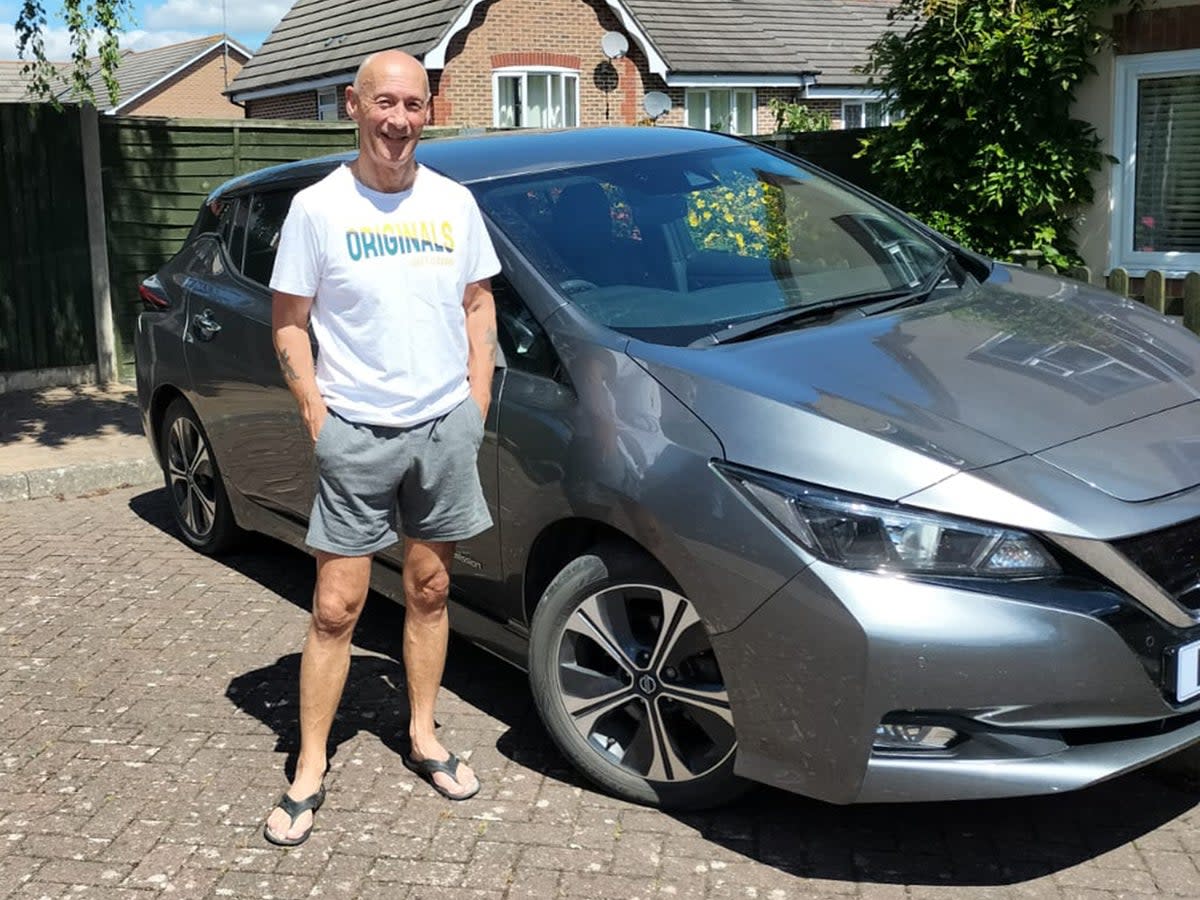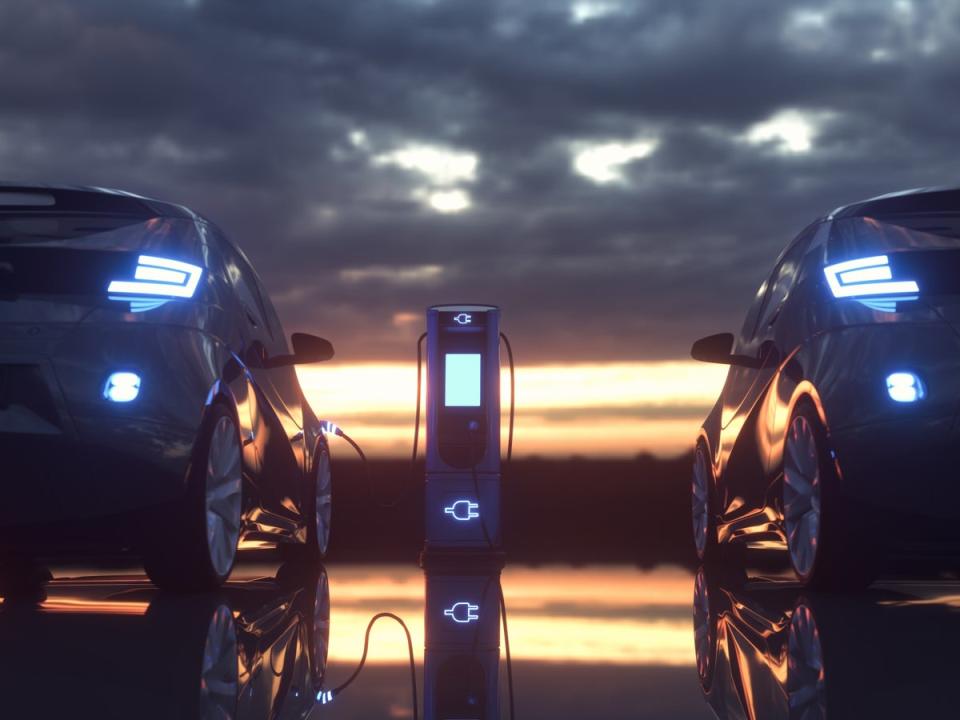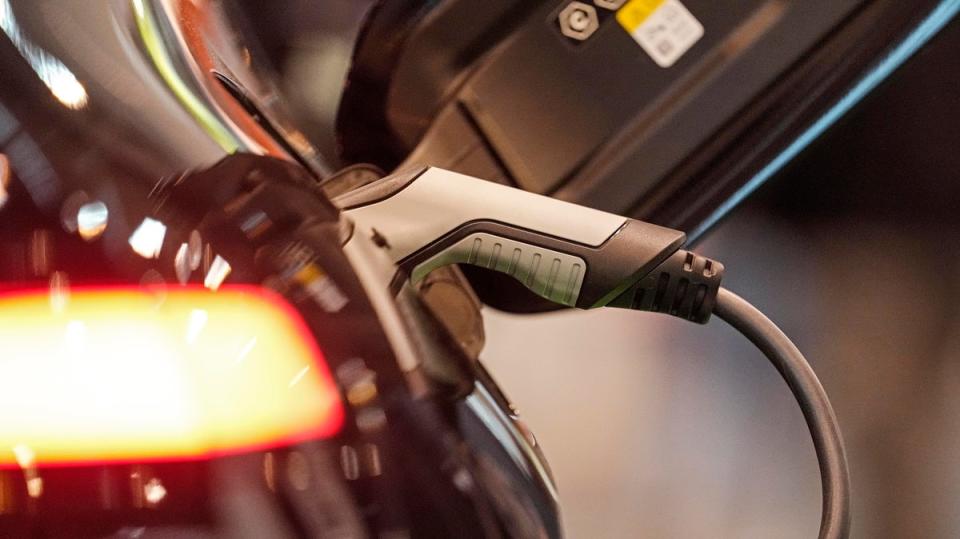‘Like a rocket’: Why one couple bought an electric car and how it’s faring so far

Graham Corner says he and his wife, Julie, have long wanted to buy an electric car to reduce their environmental footprint.
Having recently inherited some money, the couple managed to buy two new vehicles - a second-hand electric Nissan Leaf and a plug-in hybrid Cupra Formentor.
The Corners are among a growing number of UK residents turning to electric vehicles. Earlier this month it was revealed that the UK automotive industry suffered its worst June for new car sales since 1996, the one bright spot was electric vehicles with more electric cars than ever taking to the road.
Mr Corner, a 65-year-old retired lecturer, spoke to The Independent about the motivation for making the switch, the expense and how the cars fit into their life in the Somerset town of Yeovil.
A desire to cut emissions
Mr Corner says he and Mrs Corner, a 65-year-old retired nurse, would consider themselves fairly environmentally conscious and have long wanted to reduce their environmental impact through their vehicles.
“It doesn’t feel good jumping in a car to go downtown and then pumping out a load of carbon dioxide and some other gunk, so we wanted to get away from that,”he told The Independent by phone. “But they are expensive, that’s one negative, and the second is range.”
Mr Corner says without the inheritance the couple may not have been able to afford both cars, and if they had to choose would have likely opted for just the plug-in hybrid because it’s more useful for longer journeys.
His mother-in-law who is in her nineties lives in Cumbria, over 300 miles away from their home in south Somerset, and he had calculated that he would struggle to get up there in most electric vehicles without recharging.
As for recharging en route, he said he didn’t feel confident that he would find the right charger available in the right place, at the right time. So if it wasn’t for the inheritance, the pair wouldn’t have opted for an electric vehicle.
“It wouldn’t have been practical,” he said. “The general point about electrified vehicles is that you have to have cash available, or it’s got to be through your employer.”
For most people they’re just not affordable, he added.
How they fare on the roads

The Corners bought the electric Nissan Leaf in December second-hand.
“We deliberately bought second hand because unlike fossil fuel vehicles, we thought with few moving parts the chances are it wasn’t really going to be worn out in the way that fossil fueled vehicles are,” he said. “There’s no clutch and no gearbox for example.”
The Nissan Leaf Mr Corner owns has a range of about 16o miles, but in practice Mr Corner says he thinks he gets about two thirds or up to three quarters of that - around 120 miles in this case. For the Corners that does about 90 per cent of their journeys, meaning their default vehicle is the electric car.
He said he ordered the plug-in hybrid in November but it took about six months to arrive so he had had it for about a month when he spoke to The Independent in early July.
He said it wasn’t particularly fuel efficient on longer journeys, doing about 40 miles to the gallon, but on shorter journeys it used the electric motor which is as clean as the Nissan Leaf, he said.
Plug-in hybrids use batteries to power an electric motor and petrol or diesel to fuel an internal combustion engine. They typically run on electric power until the battery runs out when the car switches over the combustion engine.
“My main advice to someone who’s considering buying an electric vehicle or a hybrid, or whatever, is to really think through the journeys that you make,” he said.
For the couple, having an electric vehicle makes sense because the vast majority of journeys they do are within about 10 miles, Mr Corner said, for which they can use the car without having to charge it out and about.
The couple bought the Nissan Leaf with the smallest battery size because it was cheaper, but some have bigger ranges.
Practicalities - charging infrastructure

Mr Corner said the couple had to have a home charger installed, which with a new fuse box cost about 1,500 pounds.
He said you also need somewhere to park the car where it can be charged, which really needs to be a driveway so you don’t run the risk of tripping someone up with the cable.
Mr Corner said he had so far only charged the site at home, but planned to do a test run in Bristol where there are more compatible charging points than rural Somerset.
Charging out of the home is complicated, he said, because there are many different charging networks across the UK. For most you need to download their individual apps, or go to their websites or have a pre-registered RFID card, according to Which.
Only a minority of charging points in the UK allow customers to pay directly by credit or debit card.
“It’s a real pain,” said Mr Corner.
How they feel to drive
“They’re fantastic to drive,” he said. “I like the fact they accelerate like a rocket - my wife is less impressed by that,” he said.
Mrs Corner likes the fact that when you take your foot off the accelerator it boosts the battery, so if you’re going down a long hill in the eclectic car with your foot off the accelerator you’ll have more miles on the range indicator at the bottom than you did at the top, he said.
“It’s very comfortable, very relaxing, very quiet, it’s very pleasant,” he said.
The one minor concern about it being quiet is that you have to be careful because pedestrians often don’t hear the car, he added.
Conclusions
All in all Mr Corner said he was happy with his purchases but says he was only able to do it because money wasn’t an issue.
“I think for most people, that would be the enormous barrier at the start,” he said. “But if you haven’t got that problem, then I don’t know why anybody would want to drive a fossil fuel vehicle, particularly if you live in a town or a city.”
“It’s not great jumping in a car and feeling guilty all the time,” he added.

 Yahoo News
Yahoo News 
